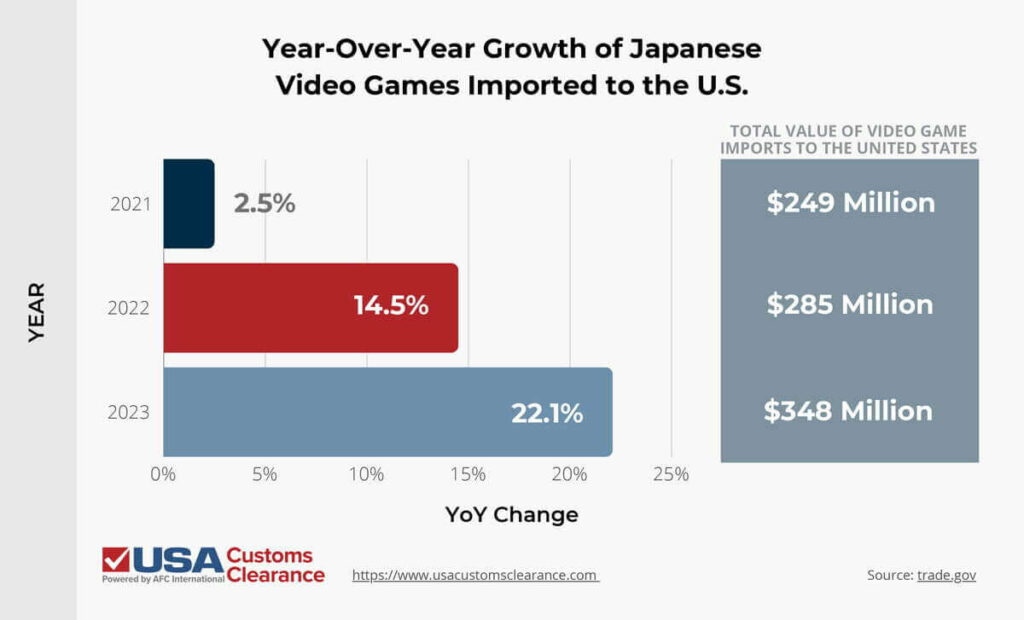
Importing video games from Japan is a major opportunity for savvy importers. In July 2024 alone, video games and related equipment accounted for $4.5 billion worth of sales in the United States. While most games, consoles, and hardware are made for multiple countries, some classic and modern video games only have Japanese versions, making them desirable to collectors in the U.S.
Key Takeaways:
Are you trying to import the latest in Japanese gaming or some forgotten retro titles? Then look no further. Our comprehensive guide will point you in the right direction.

Don't play games with USA import regulations.
Our 45 Minute Licensed Expert Consulting Will Personally Guide You.
To get started, let’s look at the two main methods people use to import goods into the United States.
While some information in this article will be relevant to private collectors, its focus is on assisting commercial importers.
Developers and publishers in Japan have created the most iconic video game characters in history, from Donkey Kong and Mario to your favorite spiky-haired amnesiac with a sword the size of a car. The country contributed significantly to shaping this lucrative industry, and Japanese console developers were ahead of the curve compared to their western counterparts for decades.
Combine this with the fact that not every Japanese video game gets English localization due to the practice of region locking, and you have a formula for demand from avid U.S. gamers. You can see this at play in the table below, which shows year-over-year growth of imported Japanese video games.

If you’re an importer looking for a way to profit from that demand and serve U.S. customers, it pays to know a little about the different products with which you’ll be dealing.
You may already be familiar with the distinctions between these categories, but for clarity’s sake, these are the general types of merchandise you’ll be looking for.
Let’s take a closer look at what importers should know about each of these categories.
Consoles are listed under the Harmonized Tariff Schedule (HTS) Code 9504.50.0000, and they incur no general rate of duty. These are just a few Japanese game systems that are highly sought after by gaming enthusiasts in the U.S.
None of these consoles officially made it to the North American market.
Other consoles to watch for are collectors editions of standard video game systems that were only officially sold in Japan. These include the orange and light-blue versions of the Nintendo 64 and an extremely rare PS4 variant featuring characters from Frozen emblazoned on the console’s casing.
Related: Importing Electronics to the USA: What You Need to Know
While arcades may not have the presence they did in the ‘80s and ‘90s, they’re not completely extinct, and many arcade cabinets end up in private collections. This creates a couple of opportunities for importers in the U.S.
Aside from simply importing rare and popular Japanese arcade games like Initial D and Hatsune Miku: Project Diva, you’ll find there’s also demand for arcade machine replacement parts. Circuit boards and other components, especially those that can’t be legally reproduced for IP reasons, can fetch high prices from collectors looking to keep their machines in working order.
Arcade cabinets are classified under the HTS code 9504.30.0010. This code also covers pinball machines, automatic bowling equipment, and similar games. Individual components will vary in classification, although many of them use the subheading 9504.20.80.
A comprehensive list of best-selling video games from Japan would be far too long to include in this article, but here are a few games with consistent demand and high value.
You might have noticed that I mentioned JRPGs more than once. Video games of this genre, which includes the popular Final Fantasy series, tend to reliably increase in value over time. Along with fighting games and shoot-em-ups, these should be a priority for importers.
HTS codes for video games are mostly located in chapter 85 of the schedule, and vary based on the format in which they were distributed (usually a disk or cartridge). If you’re unsure how to classify your imported video games, one of our licensed customs brokers can provide you with an expert consultation.

Worried about the Strict Regulations? Ask Our Experts.
Our 30 Minute Licensed Expert Consulting Will Personally Guide You.
Gamers are often selective about controllers, monitors, and other peripherals. Some of these goods are never made officially available in the U.S. For instance, the Neo Geo Pad 2 is prized among fighting game enthusiasts for its superior feel and responsiveness to complex inputs compared to conventional dual-joystick controllers.
The majority of controllers offered on the current market, including new models for retro consoles, are wireless and categorized under the HTS code 8526.92.1000 with no general rate of duty. Most other video game accessories use the same HTS code as consoles themselves, which is 9504.50.0000.
Offering video-game related merchandise to your customers is an easy way to boost sales, and you might be surprised at the range of goods that bear intellectual property (IP) from video games.
Some examples include:
In some cases, these goods are only given away at trade shows and conventions, rather than ever being sold via retail. This serves to heighten their rarity, and such items fetch top-dollar from serious video game enthusiasts.
HTS codes for such goods will obviously vary, but if you do plan to supplement your merchandise with related apparel, you may want to familiarize yourself with regulations for importing textiles.
All imports from Japan, inlcuding video games, will receive a 25% tariff. The U.S. and Japan have a deal that could lower this tariff to 15%. However, both countries have yet to put this deal in writing. This means that it remains unofficial. If adopted, the new rate will make it cheaper to import video games from Japan.
When you’re in the market for games or game related accessories, you’ll be looking at either major game publishers or niched down retro dealers. Some of the major video game publishers in Japan include:
It’s not likely that you’ll deal directly with major publishers such as these, as they have authorized distributors in the United States. Retro games are a different matter.
If you’re in the market for retro dealers instead, look to some of these options in the Japan Gaming District, Akihabara:
Purchasing from these locations may require you to work through a proxy buyer, but doing so will help you establish a reputation as a first-call supplier of imported Japanese video games and related goods.
As a hobby, video games have become far more socially acceptable in the last two decades. This helps create a rich customer base for importers, one which we’re eager to help you reach.
Customs brokers at USA Customs Clearance have years of experience helping importers find their way through the complex U.S. customs process. We offer customs clearance services for commercial importers and new importer bundles that can help personal importers and businesses alike.
Our other services include:
Don’t jump into importing video games without help from our expert team. Give us a call at (855) 912-0406 or submit a contact form online today.
 Copy URL to Clipboard
Copy URL to Clipboard

Google is changing how it surfaces content. Prioritize our high-quality guides and industry-leading coverage in search results by setting usacustomsclearance.com as a preferred source.
Add your first comment to this post